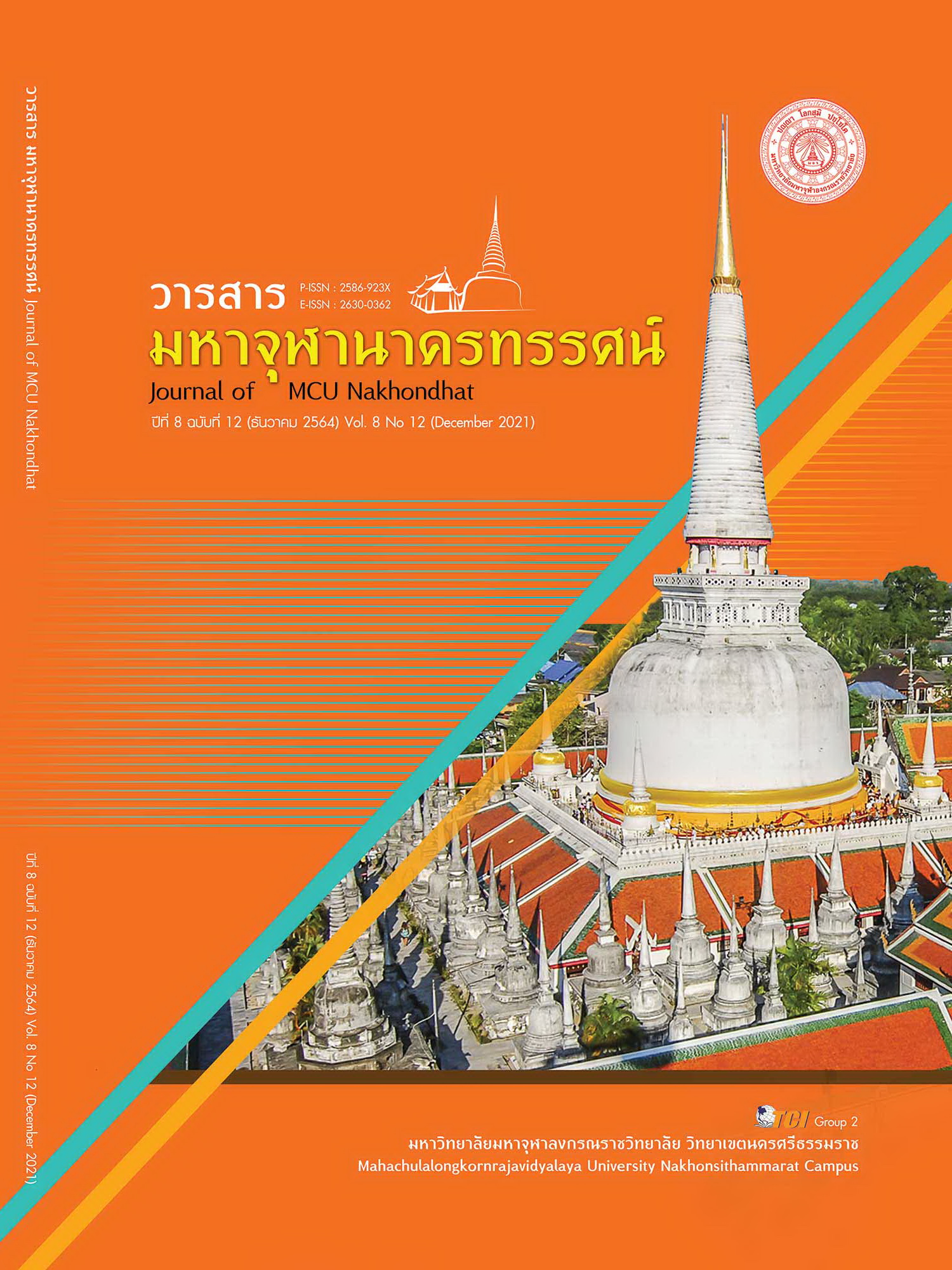THE RELATIONSHIP BETWEEN CHRISTIAN ACTIVITIES AND SPIRITUAL LIFE ON THAI CHRISTIANS PERCEPTION DURING THE COVID - 19
Main Article Content
Abstract
The objectives of this research article were to: 1) Study the level of Christian activities and the spiritual life that were borne out of the perception of Thai Christians during the COVID - 19 pandemic; and 2) Study the relationship between the Christian activities and the spiritual life that were borne out of the perception of Thai Christians during the COVID-19 pandemic, using quantitative research. The research sample consisted of 452 Thai Christians who are members of Protestant churches throughout Thailand from 3 religiousorganizations, Obtained by stratified random sampling. The employed research instruments were a questionnaire on Christian activities and the spiritual life that was borne out of the perceptions of Thai Christians, with a reliability coefficient of .92 and .95, respectively. Statistics employed for data analysis were the mean, standard deviation, and Pearson product moment correlation. Research findings showed that: 1) The overall level of Christian activities was rated at a high level. The highest mean score was found in the worship service participation, followed by doing the church’s social mission, and the lowest mean score was found in attending Bible classes; 2) The overall perception of Thai Christians was rated at a high level. The highest mean score was found in the section on sympathy for others, followed by the spiritual discipline keeping and the optimistic point of view. The lowest mean score was found in the desire of people to know Christ, and 3) the Christian activities which had a positive relationship with the spiritual life of Thai Christians were found at the highest level which was statistically significant at .01
Article Details
References
คณะกรรมการประสานงานคริสตจักรโปรเตสแตนท์แห่งประเทศไทย. (2563). คู่มือแนวทางภาคปฏิบัติเพื่อเตรียมการเปิดรอบนมัสการในช่วงสถานการณ์โควิด-19. เรียกใช้เมื่อ 30 มิถุนายน 2564 จาก https://christlike.co/wp-content/uploads/กปท._คู่มือฯ-เตรียมการเปิดรอบนมัสการ.pdf
ธีรพัฒน์ วงศ์คุ้มสิน. (2564). การพัฒนาความเห็นอกเห็นใจผู้อื่นของนิสิตจิตวิทยามหาวิทยาลัยเกษตรศาสตร์โดยใช้โปรแกรมการให้คำปรึกษาแบบกลุ่ม. วารสารสังคมศาสตร์และมนุษย์ศาสตร์, 47(1), 75-98.
เนติ คู่โชติกุล. (2563). พระธรรมสดุดีกับชีวิตฝ่ายจิตวิญญาณ. เชียงใหม่: ประชากรธุรกิจ.
พุทธรักษ์ ปราบนอก. (2558). ศาสนาโลก. วารสารมนุษยศาสตร์ สังคมศาสตร์, 32(3), 49-69.
ยงยุทธ แฉล้มวงษ์ และคณะ. (2564). ผลกระทบ COVID-19 ระบาดรอบ 2 ต่อเนื่องรอบ 3 กับทิศทางตลาดแรงงานไทย. เรียกใช้เมื่อ 1 พฤษภาคม 2564 จาก https://tdri.or.th/2021/04/ covid-19-2-3-affected-thai-labor-market/
ยุทธภัณฑ์ พินิจ. (2563). การปลูกฝังหลักจริยธรรมคริสเตียนตามกระบวนทรรศน์ปรัชญาหลังนวยุคสายกลาง: การศึกษาเชิงวิเคราะห์ วิจักษ์ และวิธาน. ใน วิทยานิพนธ์ปรัชญาดุษฎีบัณฑิต สาขาปรัชญาและ จริยศาสตร์. มหาวิทยาลัยราชภัฏสวนสุนันทา.
ยุทธภัณฑ์ พินิจ และคณะ. (2558). ปัจจัยที่มีผลต่อการอ่านพระคัมภีร์ส่วนตัวในชีวิตประจำวันของสมาชิกคริสตจักรภาคที่ 11 แห่งสภาคริสตจักรในประเทศไทย. ใน รายงานการวิจัย. มหาวิทยาลัยคริสเตีย.
วรวรรณ จันทวีเมือง และทรงฤทธิ์ ทองมีขวัญ. (2559). นักศึกษาพยาบาลกับการพัฒนาสุขภาวะทางจิตวิญญาณ. วารสารเครือข่ายวิทยาลัยพยาบาลและการสาธารณสุขภาคใต้, 3(3), 208-219.
สกุณี เกรียงชัยพร และสาณุรักษ์ ฟ่องวาริน. (2560). ความสัมพันธ์ระหว่างวินัยฝ่ายวิญญาณกับความฉลาดทางจิตวิญญาณของนักศึกษาในสถาบันคริสต์ศาสนศาสตร์กรณีศึกษา วิทยาลัยพระคริสต์ธรรม แมคกิลวารี และสถาบันกรุงเทพคริสตศาสนศาสตร์. วารสารวิชาการ วิทยาลัยแสงธรรม, 9(2), 116-129.
สมาคมพระคริสตธรรมไทย. (2559). พระคริสตธรรมคัมภีร์ ฉบับมาตรฐาน 2011. กรุงเทพมหานคร: สมาคมพระคริสตธรรมไทย.
Best, J. W. et al. (2017). Research in education (10th ed.). Uttar Pradesh: Pearson.
Earls, A. (2020). Churches Gathering Again but With Precautions. Retrieved August 15, 2020, from https://factsandtrends.net/2020/07/24/study-churches-gathering-again-but-with-precautions/
eSTAR Foundation. (2020). Thai Churches Statistic. Retrieved April 30, 2020, from http://estar.ws
Holder, A (ed.). (2005). The Blackwell Companion to Christian Spirituality. Massachusetts: Blackwell.
Kowalczyk, O. et al. (2020). Religion and Faith Perception in a Pandemic of COVID-19. he Religion and Health, 59(1), 2671–2677.
Lorgunpai, S., & Fongvarin, S. (2020). Thailand. In Ross, R. R., Alverez SJ, F. D., & Johnson, T. M. (Eds.), Christianity in East and Southeast Asia. (pp.155-166). Edinburgh. Edinburgh: Edinburgh University Press.
The United Nations. (2020). Social Impact Assessment of COVID-19 in Thailand. Retrieved August 30, 2020, from https://www.unicef.org/thailand/
media/5071/file/Social%20 Impact %20Assessment%20of%20COVID-19%20in%20Thailand.pdf
Toussaint, S. D. (1983). Acts. In Walvoord, J. F., Zuck, R. B., & Johnson. (Eds.), The Bible Knowledge Commentary: New Testament. (pp.349-434). Colorado: David C Cook.
Valerio, R., & Heugh, G. (2020). A Christian Perspective on COVID-19. Retrieved August 30, 2020, from https://learn.tearfund.org/~/media/files/tilz/ovid19/covid-19-tearfund-a-christian-perspective-on-covid-19-en.pdf?la=en
Wiersma, W. & Jurs, S. G. (2009). Research Methods in Education. Massachusetts: Pearson.
Willard, D. (1988). The Spirit of the Disciplines: Understanding How God Changes Lives. San Francisco: Harper & Row.
World Health Organization. (2020). Coronavirus disease (COVID-19) pandemic. Retrieved August 30, 2020, from https://www.who.int/emergencies/diseases/novel-coronavirus-2019
Wright, N. T. (2020). God and the Pandemic: A Christian Reflection on the Coronavirus and its Aftermath. London: Zondervan.


